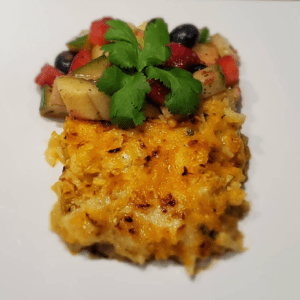Vegetarianism vs veganism

Kitchen Chronicles
The diet of prehistoric man consisted primarily of fruits, berries, seeds, nuts, roots, tubers, leaves, and herbs. It was not until about 2.6 million years ago that the first evidence of meat and bone marrow consumption, through butchery marks on fossilized bones, was observed. This marked the beginning of a significant change in early man’s diet and this change still impacts us to this day! Although man’s dietary evolution allowed him to develop into an omnivore, the history of his origins is rooted in his DNA and still has strong influence on his food choices in the modern day.

The first records of self-proclaimed vegetarians present around the sixth century. Post prehistoric man was represented by the Pythagoreans, followers of the Greek philosopher, mathematician, and the father of ethical vegetarianism, Pythagoras. They believed that vegetarianism was key in preserving peaceful human coexistence. Early Eastern religions such as Hinduism and Buddhism also encouraged vegetarianism. Their philosophies taught non-violence, respect, and compassion for all living creatures.
Fast forward to today, if you scroll the pages of any social media platform, you will find an array of pages and accounts boasting quick meal recipes, videos, reels, and tutorials packed with a host of healthy plant-based ingredients. Many of these food influencers also classify themselves as vegetarian or vegan. But aren’t they the same? What really is the difference? Do both varieties incorporate a high consumption of fruits and vegetables? What are the advantages and disadvantages of being a vegan vs a vegetarian and how does this compare with being an omnivore?

While vegans are a subset of vegetarians, the two are not the same. Vegetarians do not eat animal flesh. That is, there is no consumption of pork, chicken, beef, mutton, fish, shellfish and the likes of any flesh or meat derived from an animal. Like prehistoric man, vegetarians feast on a host of fruits, vegetables, nuts, and herbs. But there is an exception. Vegetarians, in general, do consume animal by-products such as honey, eggs, animal-based milk, cheese, butter and yogurt.
Although vegans and vegetarians have the shared philosophy of not eating meat, their differences are highlighted in the fact that vegans do not consume animal by-products. So, no sweet honey, savory cheeses, or eggs for this group! Instead, they utilize alternatives that are all plant-based and in extreme cases, vegans do not utilize any product that is animal-based!
So, what are the pros and cons of adopting a vegetarian and/or vegan lifestyle vs that of an omnivore? Although the list can be quite extensive, let’s focus on a few. Following a vegetarian/vegan diet may lower the risk for certain types of diseases. Consuming high amounts of nutrient-dense fruits, vegetables, nuts, and other plant-based foods introduces a host of health protective vitamins, minerals, antioxidants, and fiber into your diet. This combination of super foods is one of the optimal recipes for promoting a healthy heart, lowering the risk of diabetes, obesity and certain types of cancers. To take it a step further, eliminating dairy from one’s diet reduces inflammation, maintains balanced pH levels, and improves digestion.
Although vegetarianism/veganism promotes the consumption of a relatively healthy, balanced diet, the disadvantage of such a diet is the low protein and fat content, especially in the case of vegans. Low protein consumption may lead to a loss of muscle mass and an increased risk of bone fractures due bone weakening. The utilization of protein supplements in a vegetarian diet can assist in ensuring that the daily protein requirements are met to maintain a healthy balance.
Another advantage of adopting a vegetarian/vegan diet is the high intake of fiber. The increased consumption of dietary fiber contributes significantly to the health of the gastrointestinal tract. Specifically, fiber helps to regulate bowel movement, lowers cholesterol levels, boosts metabolic rates, controls blood sugar levels, and reduces the risk of colon cancer.
Conversely, these high-fiber vegetarian/vegan diets can be nutrient deficient, excluding essential nutrients, such as vitamins B12, Vitamins D, calcium, iron, zinc, iodine, and omega-3. Deficiencies of these essential vitamins and minerals can lead to weakness, tiredness, heart palpitations, shortness of breath, thyroid performance irregularity, increased risk of bone and joint pain, bone fractures, muscle pain, muscle weakness, osteoporosis, and anemia.

To ensure these deficiencies are kept at bay, consuming foods that include fortified cereals, plant-based milks, mushrooms, nutritional yeast, soy, greens, broccoli, and beans will guarantee nutritional balance in your everyday meals.
To obtain optimum benefits from a vegetarian/vegan diet, the best course of action is to consider your protein intake. Combine different plant-based protein foods to ensure that you are getting the daily recommended amounts of proteins. Be aware of the nutritional deficiencies associated with this diet and ensure that your diet is supplemented adequately. Be focused on your desired dietary journey and enjoy!
So which diet, vegetarian or vegan, is the right one for you? Choose what suits your goals and lifestyle best. And, when transitioning, consider consulting a registered dietitian to help guide you and provide helpful tips to ensure that all your nutrition needs are being met. No matter what you end up choosing, adopting a vegetarian or vegan diet will increase the nutritional quality of your diet as well as enhance your overall health.
Dr. Jerainne Johnson-Heywood is a Physical Chemist, home chef, culinary influencer and a food enthusiast, focused on creating plant-based cuisines! Her culinary brand The Uncomplicated palate






